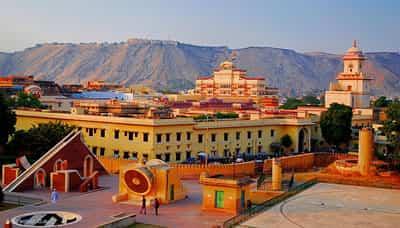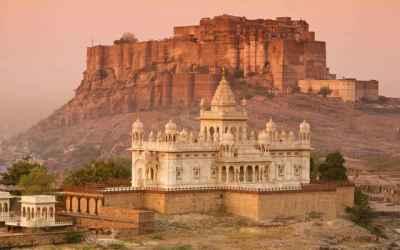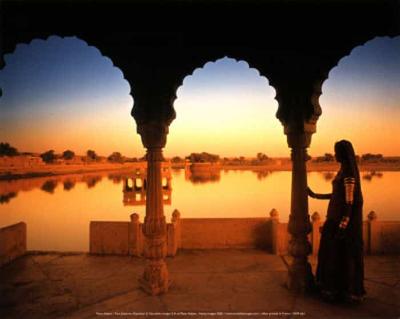The Importance of Water Conservation in Rajasthan's Tourism
Rajasthan is a land of vibrant culture, majestic palaces, and enchanting deserts. It is one of India's most popular tourist destinations, attracting millions of visitors every year. However, amidst the grandeur and beauty of this desert state, there is a pressing issue that needs immediate attention - water scarcity. Rajasthan is known for its arid climate and limited water resources, making water conservation essential for the sustainability of tourism in the region.
The Water Crisis in Rajasthan
Rajasthan faces a severe water crisis due to its geographical location and climatic conditions. The state receives limited rainfall, and the annual precipitation is highly erratic. Moreover, the majority of Rajasthan's land is sandy and unable to retain water. As a result, the groundwater levels have been depleting at an alarming rate.
The water scarcity in Rajasthan affects every aspect of life, including tourism. In recent years, many popular tourist destinations in the state have faced acute water shortages. The scarcity is especially pronounced in rural areas and remote villages that rely heavily on tourism for economic sustenance.
The Impact on Tourism
The water crisis has a significant impact on tourism in Rajasthan. Many tourists visit the state to experience its rich heritage and indulge in various activities like camel safaris, desert camping, and visiting historic forts. However, these experiences heavily depend on the availability of water.
Hotels and resorts in Rajasthan are often situated in remote areas where the water supply is limited. Due to the scarcity, some accommodations have been forced to reduce their capacity or even shut down their operations temporarily. The lack of water also affects the hygiene and sanitation standards of these establishments, further deterring tourists from visiting.
Moreover, the scarcity of water has an adverse effect on the overall experience of tourists. Limited water supply means that visitors may face restrictions on daily water usage, such as reduced shower time or limited access to swimming pools. This can significantly impact the comfort and satisfaction of travelers.
The Importance of Water Conservation
Given the crucial role that water plays in tourism, it is imperative to emphasize and implement water conservation practices in Rajasthan. It is not only essential for the well-being of the local communities and ecosystems but also for the long-term sustainability of the tourism industry.
Water conservation efforts involve intelligent and responsible use of water resources, reduction of wastage, and promotion of sustainable practices. Here are some measures that can be undertaken:
- Rainwater Harvesting: Encouraging the collection and storage of rainwater can be a game-changer in water management. By implementing rainwater harvesting techniques, Rajasthan can supplement its water supply and reduce the burden on groundwater sources.
- Water Recycling and Reuse: Developing infrastructure and systems for the treatment and reuse of wastewater can significantly minimize water wastage. Treating and repurposing greywater for non-potable purposes like landscaping or toilet flushing can help conserve water.
- Education and Awareness: Creating awareness among locals, tourists, and hospitality businesses about the importance of water conservation can lead to a collective effort in preserving water resources. Promoting water-saving habits and responsible tourism practices can make a significant difference.
- Government Policies: The state government should implement strict regulations and policies to manage water resources effectively. Encouraging the use of water-saving technologies, enacting water conservation laws, and promoting sustainable tourism practices can contribute to the overall conservation efforts.
- Community Participation: Engaging local communities and stakeholders in water conservation initiatives is crucial. Encouraging individuals to take ownership of their water usage and involving them in decision-making processes can pave the way for more sustainable practices.
The Road Ahead
Rajasthan's tourism industry has the potential to flourish, but not without addressing the water crisis. The importance of water conservation cannot be stressed enough, as it is directly linked to the sustainability and attractiveness of the state as a tourist destination.
Efforts must be made at all levels - individual, community, and government - to conserve water resources and promote sustainable tourism practices. Only through responsible management and collective action can Rajasthan overcome its water scarcity challenges and continue to delight visitors from around the world.
Conclusion:
Water conservation is not an option but a necessity for the tourism industry in Rajasthan. By implementing sustainable practices and raising awareness about the importance of water, we can ensure the long-term viability of tourism in the state. Every traveler, local resident, and hospitality establishment must recognize their role in conserving this precious resource. Together, let us work towards preserving Rajasthan's natural beauty and cultural heritage for generations to come.
Share this blog post and spread the message of water conservation in Rajasthan's tourism!
Disclaimer : The information provided in this blog is for general informational purposes only. While we strive to keep the content accurate and updated, TravelSetu assumes no liability for errors or omissions. If you believe any part of this blog infringes your rights or causes concern, please notify us immediately at info[at]travelsetu[dot]com so that appropriate action can be taken.







